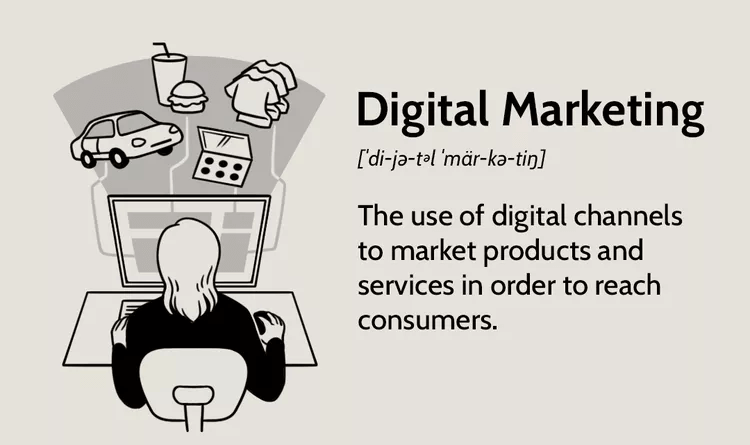
Introduction
In today’s hyper-connected world, mastering digital marketing is a necessity for businesses striving to stay competitive. From small businesses to multinational corporations, leveraging online marketing strategies is crucial to reach customers, increase brand visibility, and drive conversions.
Digital marketing is a comprehensive strategy that utilizes various digital channels, platforms, and technologies to promote products, services, or brands to a target audience. In a world where technology plays a pivotal role in our daily lives, businesses are increasingly turning to digital marketing to reach and engage with their customers. This multifaceted approach encompasses a wide array of online marketing activities, each serving a unique purpose in the overarching goal of creating brand awareness, driving traffic, and ultimately boosting sales.
Types Of Digital Marketing:
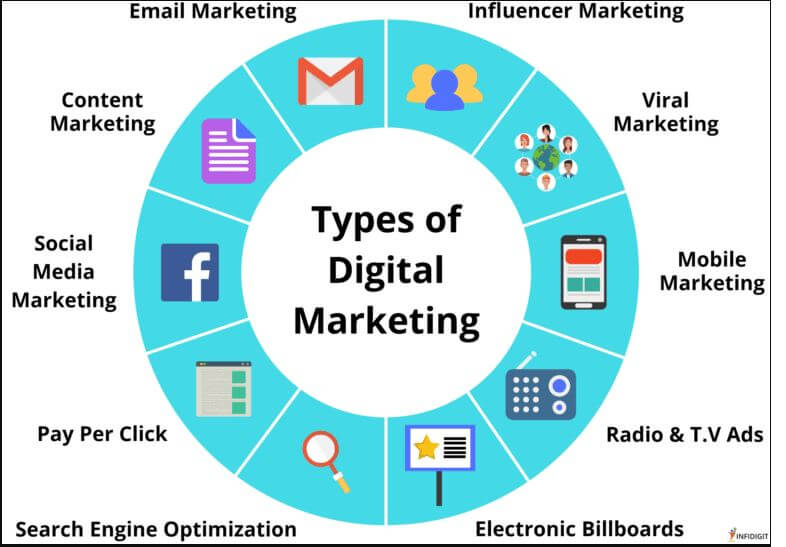
- Search Engine Optimization (SEO)
- Pay Per Click (PPC)
- Social Media Marketing (SMM)
- Content Marketing
- Email Marketing
- Influencer/Affiliate Marketing
1) Search Engine Optimization (SEO):
One of the fundamental components of digital marketing is Search Engine Optimization (SEO). SEO involves optimizing a website’s content, structure, and backlinks to rank higher in search engine results pages (SERPs). By strategically incorporating relevant keywords, improving site speed, and enhancing user experience, businesses aim to increase their visibility online, making it easier for potential customers to find them when searching for related products or services.
The following are the key components of SEO:
1. Keyword Research
Keyword research is a process of identifying the most relevant and profitable keywords that are used by potential customers when searching for products or services online. It involves using various tools to analyze search volume, competition, and relevance of the keywords. This helps in understanding the market and target audience, which is essential in optimizing content for SEO.
2. On-Page Optimization
On-page optimization refers to the process of optimizing individual web pages to rank higher and earn more relevant traffic in search engines. It involves optimizing the content, meta tags, headings, images, and other elements of a webpage to make it more search engine friendly.
3. Off-Page Optimization
Off-page optimization refers to the activities that are performed outside of the website to improve its visibility and ranking. This includes building high-quality backlinks from relevant and authoritative websites, social media marketing, and influencer outreach.
4. Technical SEO
Technical SEO is the process of optimizing the technical aspects of a website to improve its visibility and ranking in search engines. This includes optimizing website speed, mobile-friendliness, website structure, and schema markup.
5. Content Marketing
Content marketing is a key component of SEO that involves creating and publishing high-quality, informative, and engaging content that attracts organic traffic and earns backlinks from other websites. This includes blog posts, infographics, videos, and other types of content that provide value to the target audience.
6. Analytics and Reporting
Analytics and reporting help in tracking and measuring the performance of SEO strategies. This involves using various tools, such as Google Analytics, to monitor website traffic, keyword rankings, and other metrics. This helps in identifying the areas that need improvement and refining the SEO strategies accordingly.

2) Pay Per Click (PPC):
Pay-Per-Click (PPC) Advertising is a model where advertisers pay a fee each time their ad is clicked. Google Ads and social media advertising platforms offer businesses the ability to create targeted ad campaigns, reaching users based on specific demographics, interests, and online behavior. This form of advertising provides a measurable and cost-effective way to drive traffic to websites and generate leads.
Benefits of PPC
PPC advertising offers several benefits for businesses, including:
- Immediate Results: PPC advertising can drive traffic to a website immediately. Once an ad is approved and activated, it can start generating clicks and visits to the website right away.
- Targeted Advertising: PPC allows businesses to target their ads to specific audiences based on factors such as location, age, gender, interests, and behavior. This helps in reaching the right people and generating more qualified leads.
- Cost Control: PPC allows businesses to set their daily or monthly ad budget, which gives them control over their advertising spend. Advertisers only pay when someone clicks on their ad, which means they are not charged for impressions or views that do not result in clicks.
- Measurable Results: PPC advertising provides detailed performance metrics such as clicks, impressions, conversion rates, and return on ad spend (ROAS). This helps businesses measure the effectiveness of their ads and refine their strategies accordingly.
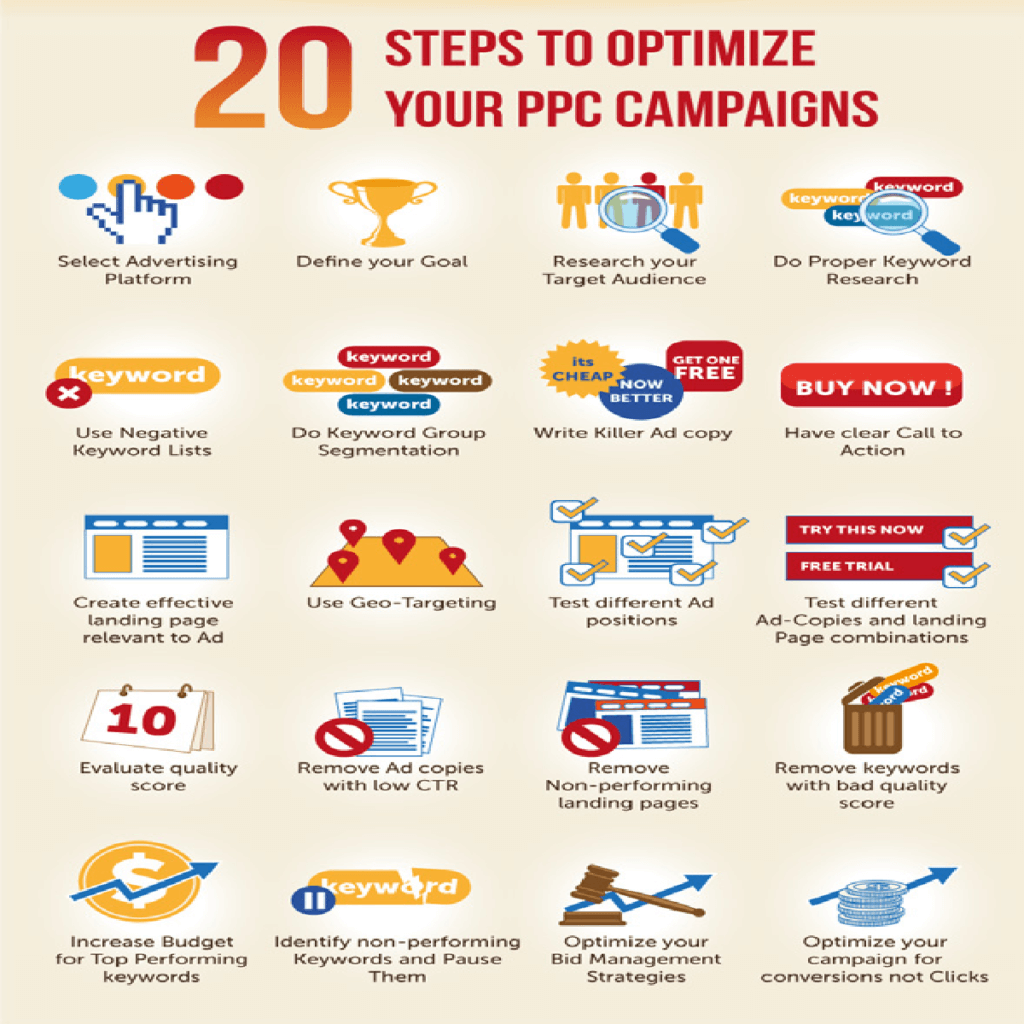
3) Social Media Marketing (SMM):
Social media marketing is the process of promoting a brand, product, or service on social media platforms to reach and engage with a target audience. It involves creating and sharing content that is designed to attract, educate, and entertain social media users, with the ultimate goal of driving traffic to a website or converting users into customers.
Social media marketing has become an essential component of modern digital marketing strategies due to the significant growth and widespread adoption of social media platforms. According to a survey, there are over 4.2 billion active social media users worldwide, which presents a massive opportunity for businesses to reach their target audience.
Benefits of Social Media Marketing
Social media marketing offers several benefits for businesses, including:
- Increased Brand Awareness: Social media platforms allow businesses to reach a vast audience and increase their brand awareness. By regularly sharing engaging and informative content, businesses can attract new followers and keep their existing audience engaged.
- Targeted Advertising: Social media platforms allow businesses to target their advertising to specific audiences based on factors such as age, gender, interests, and behavior. This helps businesses reach the right people and generate more qualified leads.
- Customer Engagement: Social media platforms allow businesses to interact with their audience and build relationships with their customers. By responding to comments and messages, businesses can provide excellent customer service and improve their brand reputation.
- Cost-Effective: Social media marketing is often more cost-effective than traditional advertising methods. Many social media platforms offer affordable advertising options, and businesses can also create and share organic content without any cost.
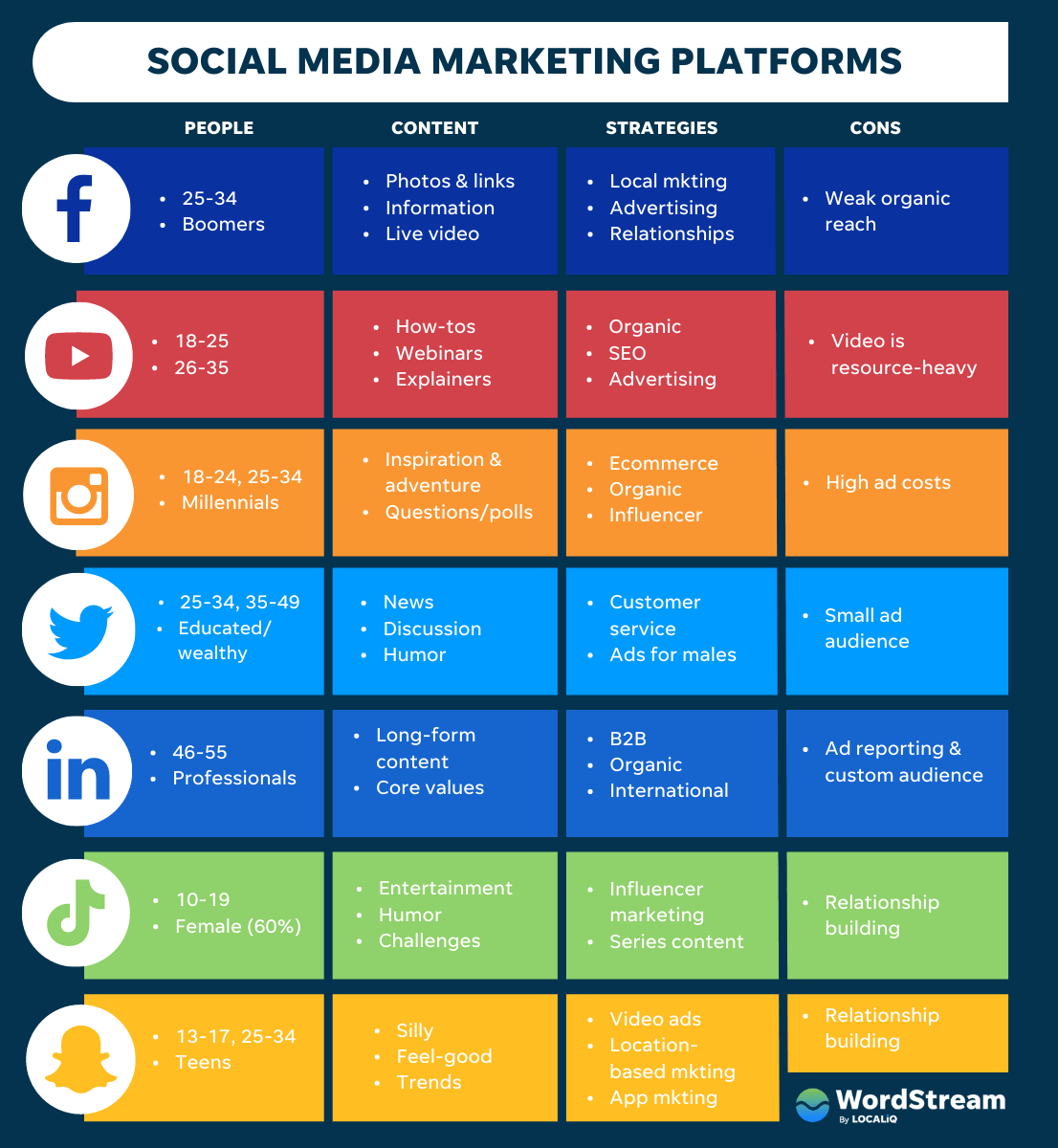
4) Content Marketing:
Content marketing is a type of marketing which involves creating relevant and consistent content to attract defined audience.
Content marketing is the practice of creating and distributing valuable, relevant, and consistent content to attract and retain a clearly defined audience and, ultimately, to drive profitable customer action. The goal of content marketing is to create a strong relationship with the target audience by providing them with informative and engaging content that helps them solve a problem or meet a need.
Benefits of Content Marketing
Content marketing offers several benefits for businesses, including:
- Improved Brand Awareness: Content marketing can help businesses increase their visibility and reach a wider audience. By creating and sharing informative and engaging content, businesses can attract new followers and keep their existing audience engaged.
- Increased Website Traffic: Content marketing can drive traffic to a business’s website by providing valuable information and answering the target audience’s questions. This can help businesses attract more qualified leads and improve their search engine rankings.
- Enhanced Customer Engagement: Content marketing can help businesses build relationships with their customers by providing them with informative and helpful content. By engaging with their audience, businesses can improve their brand reputation and customer loyalty.
- Cost-Effective: Content marketing is often more cost-effective than traditional advertising methods. Many forms of content can be created and shared without any cost, and businesses can also repurpose their existing content to reach a wider audience.
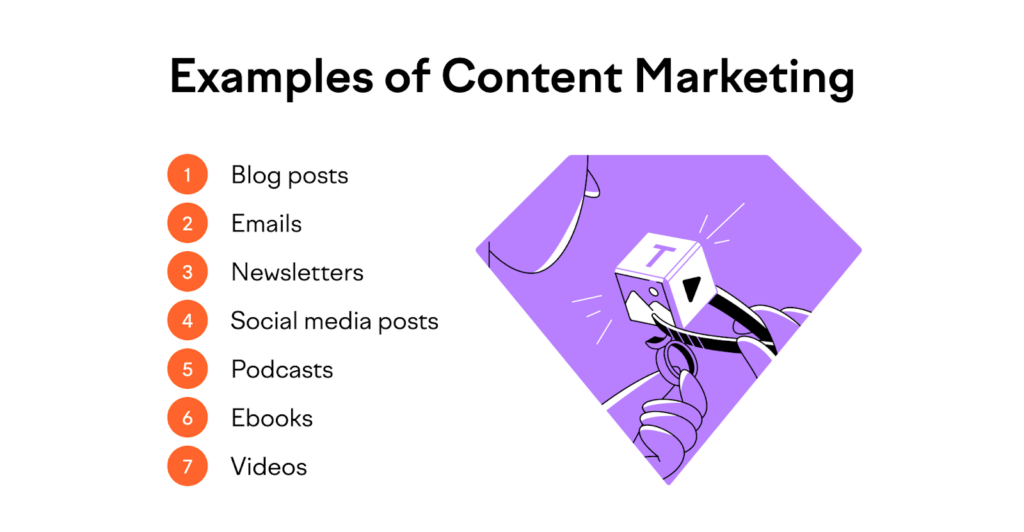
5) Email Marketing :
Email marketing is a process of sending commercial messages to group of people via email.
Email marketing is the practice of using email to promote a product, service, or brand to a target audience. It involves sending commercial messages, newsletters, or promotional campaigns to a list of subscribers who have opted-in to receive these communications.
Types of Email Marketing
There are various types of email marketing campaigns that businesses can use to communicate with their audience, including:
- Promotional Emails: Promotional emails are used to promote a product, service, or offer to the audience. These emails typically contain a call-to-action (CTA) that encourages the recipient to take a specific action, such as making a purchase or signing up for a free trial.
- Newsletter Emails: Newsletter emails are used to provide subscribers with updates, news, and content related to the business or industry. These emails typically contain a mix of curated and original content, and may also include promotional messages.
- Welcome Emails: Welcome emails are sent to new subscribers to introduce them to the business, provide them with relevant information, and encourage them to engage with the brand.
- Abandoned Cart Emails: Abandoned cart emails are sent to customers who have added items to their cart but failed to complete the purchase. These emails typically include a reminder of the items left in the cart, and may offer a discount or incentive to encourage the customer to complete the purchase.
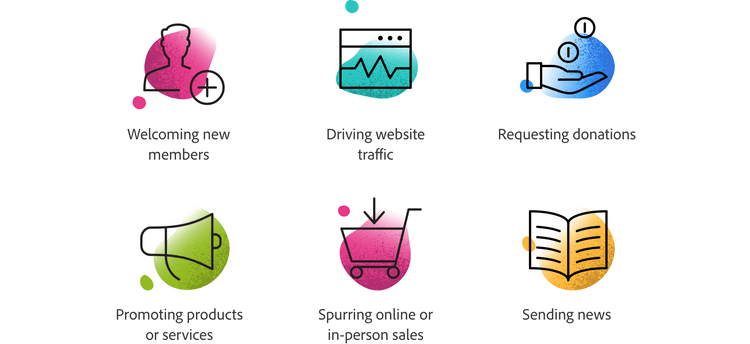
6) Influencer/Affiliate Marketing:
Influencer marketing is a type of online networking advertising which includes influencers to endorse and make reference to your products.
Influencer marketing and affiliate marketing are two popular types of digital marketing that involve leveraging the influence of individuals or organizations to promote products or services to a target audience. Let’s take a closer look at both types of marketing.
Influencer Marketing
Influencer marketing involves partnering with individuals or organizations that have a large following on social media, blogs, or other online channels. These individuals, also known as influencers, have the ability to sway the opinions of their followers and can help businesses reach a wider audience.
The key to successful influencer marketing is finding the right influencer who aligns with your brand values and target audience. Once an influencer is identified, businesses can partner with them to create sponsored content that promotes their products or services. This can include product reviews, endorsements, or other forms of content that highlight the benefits of the product or service.
Influencer marketing is effective because it allows businesses to reach a highly targeted audience through the influencer’s existing network. It also provides social proof, as the endorsement of a trusted influencer can help build credibility and trust with potential customers.
Affiliate Marketing
Affiliate marketing involves partnering with individuals or organizations, known as affiliates, who promote a business’s products or services in exchange for a commission. Affiliates can promote products through their own website, blog, social media channels, or other online platforms.
The key to successful affiliate marketing is finding the right affiliates who have a strong following in your target audience. Once an affiliate is identified, businesses can provide them with promotional materials, such as banners, links, or other content, that the affiliate can use to promote the product or service.
Affiliate marketing is effective because it provides businesses with a cost-effective way to promote their products or services through a network of affiliates. It also allows for easy tracking and measurement of performance, as businesses can track clicks, conversions, and other metrics to determine the effectiveness of their affiliate program.
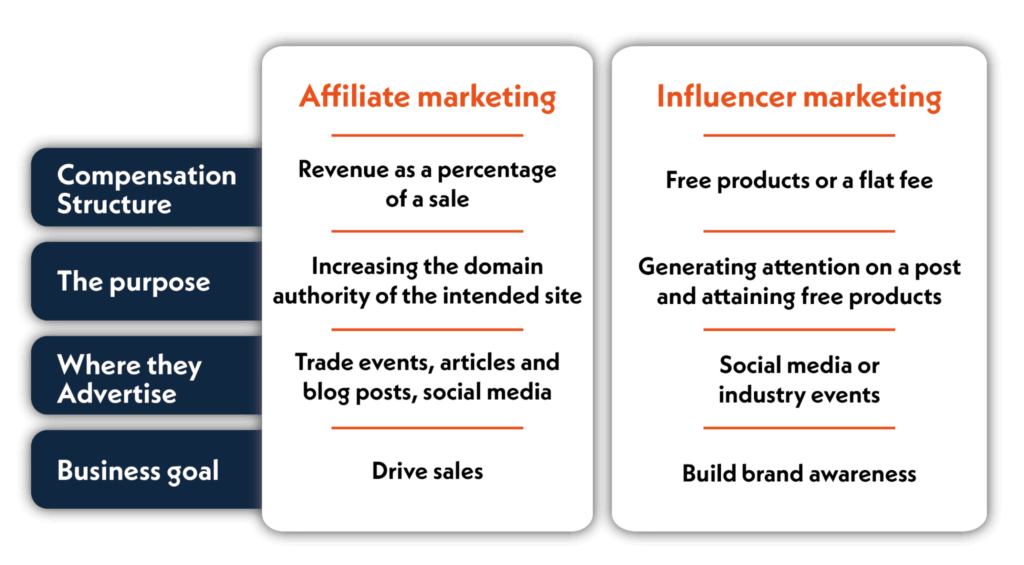
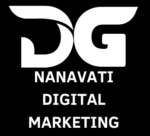
Your tips on email marketing campaign optimization have been practical.
Thank you!
corporis consequatur fugiat tempore autem consequatur excepturi debitis non deleniti. qui est et repudiandae deserunt magnam eum tenetur quos tempora deserunt provident ullam voluptas et.
The advice on creating engaging email content was just perfect!
Thank you!
I learned a lot from your post on integrating CRM with email marketing.
Thank you!